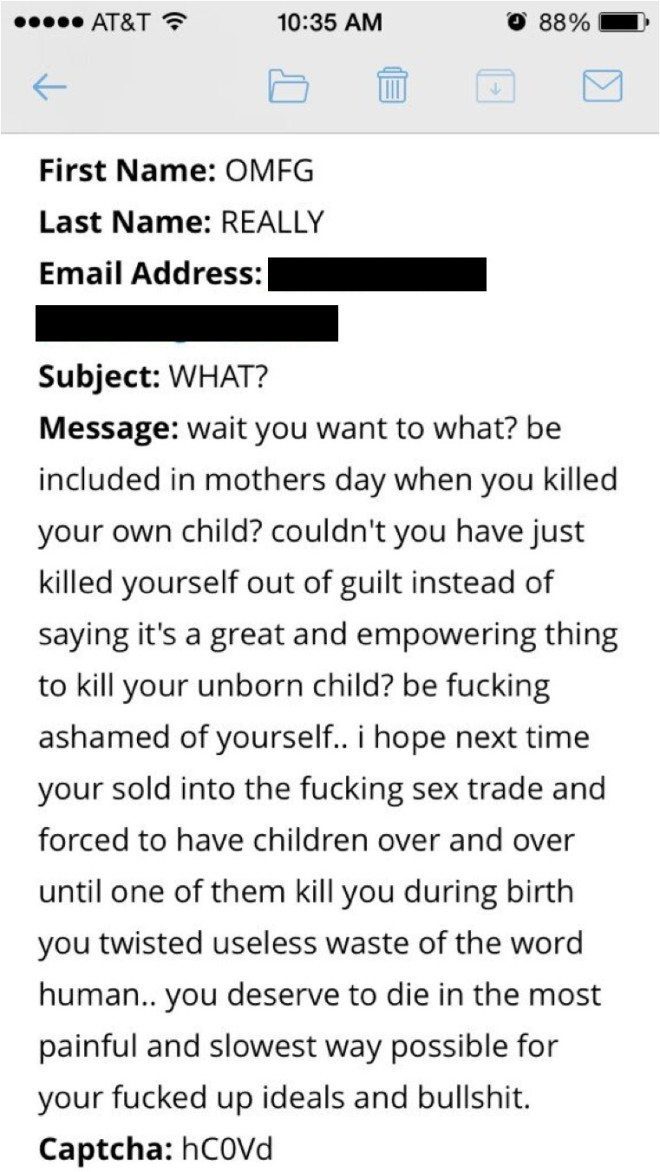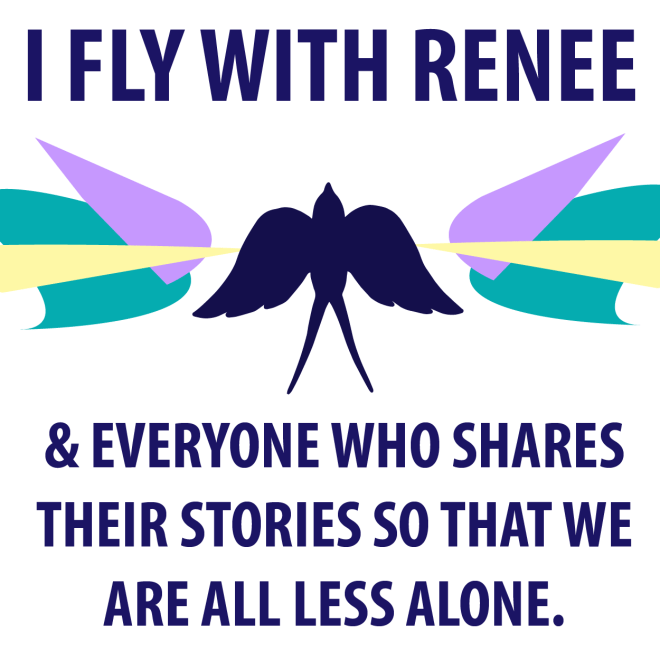What Happens When We Share Our Abortion Stories: Hate, Vitriol, But Also Love
Because of an article I wrote about my abortion story, people I've never met requested that I kill myself, get raped, die in childbirth, and be sterilized. But I also received love and support from friends and allies, and I'd love to see a whole movement emerge telling people who share their abortion stories: #YouAreLoved.

Wednesday morning, like most, I rolled over in bed, hugged Harley the cat, and looked at my phone to check the morning’s news stories.
“Congrats on killing your baby. Nice job,” the first Facebook post said. It had seven “likes.”
Throughout the morning, Facebook posts, messages, emails, and tweets rolled in calling me a “murdering piece of garbage,” “twisted waste of a human,” and a “disgusting slut,” among many other things.
Because of a Mamas Day article I wrote on the Huffington Post about how an abortion changed the way I experience Mother’s Day, people I’ve never met requested that I kill myself, get raped, die in childbirth (as a Black woman, that is something for which I am at higher risk), and be sterilized (something that many women of color have experienced). They asked if I have dementia (something I watched my grandmother suffer from) and hoped that I would be sold into the “sex trade” and “forced to give birth over and over again and then die from giving birth.”
Charming.
I hadn’t even gotten out of bed yet.
You might be shocked at these messages, appalled even, but this is actually quite normal. This is what happens when we share our abortion stories publicly. This harassment is now part of my abortion experience.
Recently, Emily Letts bravely filmed her abortion in order to show others that they aren’t alone, that it is a safe procedure, and that there is support out there. After anti-choice activists got wind of the video, she had “threats and curses put on [her] uterus,” parody videos were made mocking her and coat hanger abortions, and countless articles have been written. Even Sarah Palin weighed in on the shame game. As Letts continues to share her story, the harassment continues.
But this kind of stigma-based attack is not just something people experience from strangers. Earlier this month, boxer Floyd Mayweather Jr. publicly shamed his ex-fiancée, Shantel Jackson, on his Instagram account for having an abortion. I watched on Twitter as messages of hate toward Jackson poured out; people even wished death upon her. Many of her supporters pointed out that Mayweather had served time for domestic violence and harassment after abusing his ex-girlfriend in front of their children, which is an important point given that his behavior of outing her is in itself an abusive violation of her privacy. As an abuser, it’s no wonder that he would use his platform to have more people degrade and shame her.
What’s frustrating is that this is all too often deemed “part of living publicly.” It is seen as the ugly part of sharing your story, and something for which you just grow a “thick skin.”
But that’s no longer good enough for me.
Every week I have people telling me they want to share their abortion stories, but then they see the backlash people like Letts, Jackson, and now I have faced, and it makes them run in the other direction.
As a movement, we often ask people to share their stories to change policy and influence the hearts and minds of our country—but at what cost? We ask people to put themselves out there, but we do not really think about the possible impacts on their lives. We forget, just as our opposition often does, the real people behind the political debates. Given my personal experiences and my belief that storytelling is an important tool to raise awareness and empower individuals, I often think about how we can (and must) show love for people who share their experiences. How can we adequately show support for the millions of people who’ve had abortions, but are scared to speak out because they see the violence hurled at those who dare to share? These hurtful comments aren’t only being seen by the person they’re aimed at, they’re being seen by the one in three women who’ve had an abortion who are also online and the people who are considering their options.
I tweeted messages of love and support to Jackson, Letts, and others who have faced vitriol after their abortion was made public, but my comments were lost in the sea of vile comments and debates over the right to an abortion.
As I write this, I continue to receive message after message of hate for my own storytelling. I just received a threat of violence should that person see me on the street. I take those threats seriously since I have been approached and threatened in person for saying I had an abortion. It’s hard to keep working in a movement and sharing your story when that is what you see every day. This is unacceptable.
We have to look at how we can stand together in solidarity behind the people we’re asking to share their abortion stories publicly. There are many campaigns and organizations asking people to share their stories, and it’s wonderful to see so many women taking a step into vulnerability to share and speak publicly. But, after they share, then what? How is our movement following up with them to ensure they receive love and support as their inbox fills with hate? No matter how anyone feels about abortion, no one deserves the abhorrent comments that are flung at us.
I don’t claim to have all the answers, but I have thought about what has helped me (and what I wish I saw more often). And that includes:
Call attention to the behavior. We must call this behavior what it is: abuse and harassment. We cannot sit idly by as people threaten the lives of those in our movement who are out there either speaking in support of abortion access or sharing their stories. We must support them in reporting the harassment through the social media platforms and to authorities, if they so choose. I continue to turn to friends about what actions I can take to defend myself, but very few people know what can be done. Let’s do the research, lean on those who have experienced and written about online harassment, and demand that authorities take action to protect us online. We must demand that Congress pass laws to catch up to the times. For people who are vulnerable and visible online, this is very real.
Have our backs. If we want people to share their stories for our organizations and our movement, we must be willing to hold their hand in the best and worst of times. The folks who volunteer and work at our organizations take on a lot when they write op-eds, put their names on flyers, and speak out on behalf of an organization’s mission. I’ve been sharing my story with and on behalf of organizations for several years. The staff at Forward Together, the nonprofit running the Mamas Day campaign, asked me how they could help and “share the heat” with me. This was the first time any organization had ever offered that. We didn’t know what that would look like, because it rarely happens, but the simple fact that they offered reminded me that I am not doing this alone. Their tweets and posts let others know they had my back.
Let your storyteller know your organization supports them, cares for their well-being, and will publicly offer them love and support. They are not alone.
Know #YouAreLoved. I also realized that our society has few models of what support looks like. Rather than judging people, let’s just show up in solidarity for the bravery it took them to speak publicly. The way I have survived these constant attacks is by receiving messages of love and support, both online and in person. Hugs make all the difference.
Today, I cried because of this simple tweet from Mikki Kendall:
So can you do me a favor internet? Can you go flood @RBraceySherman‘s mentions with love, cute animals, pretty pics etc?
— Mikki Kendall (@Karnythia) May 15, 2014
I don’t know Kendall. We’ve never met. But because of her tweet, my Twitter feed flooded with messages of support, kittens, and puppies. All of a sudden, the day felt bearable again.
I again wept tears of joy when the Reproductive Health Technologies Project, the organization I intern for, partnered with the Repeal Hyde Art Project to make beautiful memes to offer support for me, Emily Letts, and all the other people who share their abortion stories in the face of hate.
So that’s what I’m asking of the movement: Let’s start a new campaign to let those who are vulnerable, brave, and share their stories know they are loved—each and every time they receive hate, and all the days in between! Join me in reminding the one in three women who’ve had an abortion that they are loved and respected using #YouAreLoved on Twitter. They need to know that we are an army of support and we’ve got their backs. And just as importantly, the people thinking about sharing their abortion stories will know that we will have their backs too. It is our responsibility to stick together.
And remember, through it all, #YouAreLoved.


